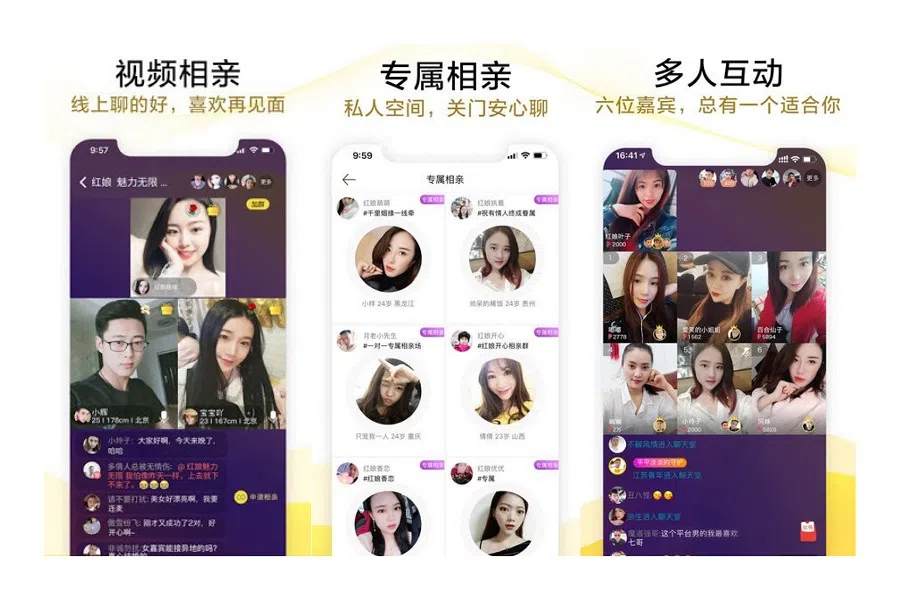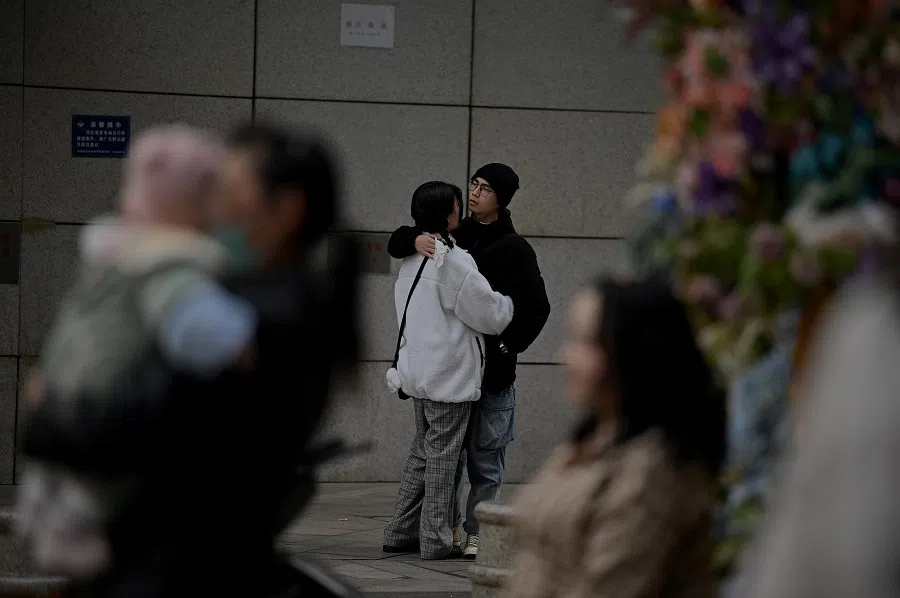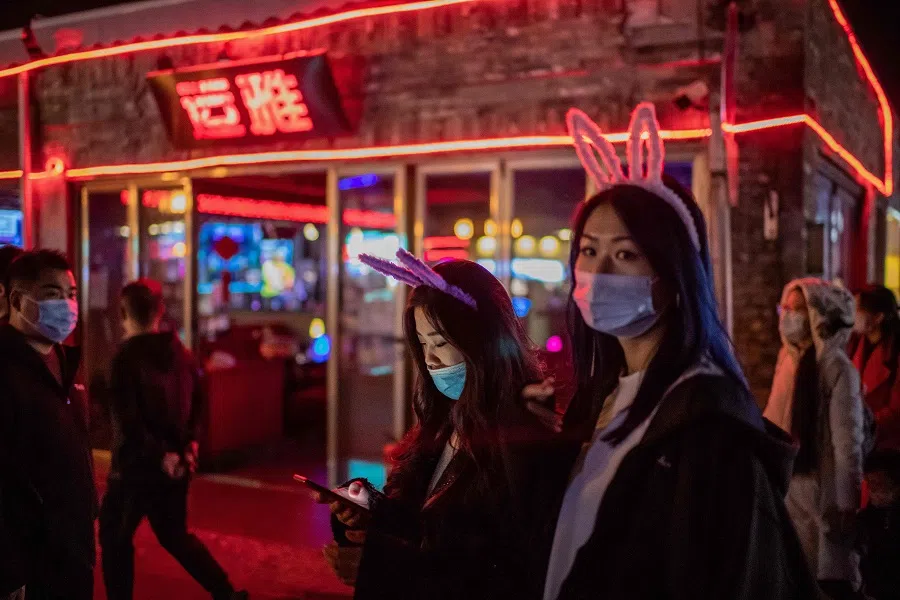Love in the cloud: China's emerging livestream matchmaking industry
It was probably a matter of time before online entrepreneurs found a way to meet the perennial demand for love and marriage in China - through livestream matchmaking. From the looks of it, it is a match made in heaven. Over the past two years, scores of people, particularly in smaller cities and towns, have used "cloud dating" mobile live-streaming apps to chat with prospective matches in real time. Seeing opportunity, various platforms like Alibaba, Tencent, Momo, Huya TV, Inke, and Huajiao have entered the fray. Covid-19 has made it even more common to seek out remote means of having one's head in the clouds, basking in the novelty of new love. Zaobao journalist Zeng Shi has the details.

"You're really born in 1984?"
"Sorry that I look more mature..."
"I have zero tolerance for guys who gamble. Do you gamble?"
"Of course not, I don't gamble or drink. I smoke a little though..."
Such exchanges are common on China's "cloud dating" mobile livestreaming apps. In a virtual chat room, a woman and a man, facilitated by a matchmaker, get to know each other better via a video livestream. The matchmaker plays host, steering the conversation and lightening the atmosphere. "Passersby'' can pop in and observe these blind dates. If they see someone they are interested in, they are free to send them a virtual rose.
Most importantly, these platforms do not use airbrushing tools or filters, hence people are less likely to get a shock when they meet each other offline.
What you see is what you get?
This is China's emerging cloud livestream matchmaking industry, providing a new platform for going on blind dates and making friends. After online chats, both parties can meet offline if they want to take it a step further.
Unlike traditional dating sites, livestream matchmaking seeks to give a reality check from the get-go - both parties converse face-to-face online and can observe each other's appearance and manners. Most importantly, these platforms do not use airbrushing tools or filters, hence people are less likely to get a shock when they meet each other offline.
With users' particulars in hand, the platform uses big data to generate possible matches. Such information is displayed prominently on screen, informing users that a prospective date "lives in the same city" or "earns more". If users hesitate to enter a livestreaming chat room, a virtual matchmaker "pops up" and sends a personal invitation.
Apart from a three-person date involving the matched pair and the matchmaker, there are options for a seven-person date or an exclusive date. The former unfolds like a group chat where users take turns to introduce themselves and interact. The latter refers to private chat rooms which do not allow observers.
... a "flying kiss" costs 99 roses, declaring "love at first sight" costs 1001 roses, while calling your date "my dream goddess" costs 3999 roses.

Compared to traditional online dating sites whose registration fees often run into thousands of dollars, livestreaming matchmaking platforms have a much lower threshold. On livestreaming matchmaking platform Yi Dui (伊对), virtual roses are gift currency. For a fee of 6 RMB (S$1.20), users would get 60 stalks of roses to spend. A three-person date costs 20 roses per minute. It is then up to the users to decide on the gifts they want to lavish on the other party: a "flying kiss" costs 99 roses, declaring "love at first sight" costs 1001 roses, while calling your date "my dream goddess" costs 3999 roses.
Gaining insight into a prospective mate's lifestyle is perhaps one of the defining characteristics of these livestreamed blind dates. While on the date, some are eating, while others are lounging in bed or even working at an eatery. For instance, a man was painting a wall on a ladder while talking to his date. He ended up being praised for being incredibly hardworking!
Matchmaker job a lucrative one
The job of a livestream matchmaker has become an emerging career option too. According to a platform owner, these matchmakers are not employees but are in a business relationship much like that between Taobao and Taobao store owners. After training and assessment, matchmakers go on to provide online matchmaking services, and have to hit quotas and gain a good reputation before they can get a commission. Hence, the platform is "providing them with flexible employment opportunities".
Yi Dui for instance, an app that entered the industry in 2018, has over 40,000 matchmakers and over 40 million users, and is a microcosm of the rapid growth of China's livestream matchmaking industry.

Dating and marriage is a good that is always in demand in society. With widespread livestreaming, content and formats for such services are becoming increasingly innovative and diverse. Numerous companies have entered the market following the successful match between livestreaming and matchmaking. According to statistics from business information website 36Kr (36氪), platforms such as Alibaba, Tencent, Momo, Huya TV, Inke, and Huajiao have all expanded into the livestream matchmaking business.
According to a report by chyxx.com, a Chinese industry information website, 2020 marked the beginning of the livestream matchmaking era. Due to the pandemic, platform users and activity reached new heights.
Covid-19 a boon for livestream matchmaking
The Covid-19 pandemic has also given the livestream matchmaking business a boost. During the Chinese New Year period in 2020, Yi Dui app downloads increased 1.5 times month-on-month. Activity on the app also saw an increase of over 50%. During the same period, active users on another app known as Dui Yuan (对缘) increased by a whopping 300%, which translates into a total of over 2 million blind dates livestreamed, or nearly 1 million hours streamed in total.
According to a report by chyxx.com, a Chinese industry information website, 2020 marked the beginning of the livestream matchmaking era. Due to the pandemic, platform users and activity reached new heights. The report said that this market has huge potential and much room for growth; differentiated products will soon mushroom to prevent oversaturation in a market offering similar services.
Conversely, the market for traditional dating agencies has shrunk. According to Baidu search data, during Chinese New Year this year, search interest for Baihe.com decreased by 45% year-on-year, while that for Jiayuan.com decreased by 37%.
Livestream matchmaking platforms fight to capture sinking markets
Previously launched social products for strangers to meet in the Chinese market mostly targeted and prioritised people in Tier 1 and Tier 2 cities. Following intensifying competition in the livestream industry, China's livestream matchmaking platforms are currently seizing sinking markets (that is, small town and rural markets) first, entering the large Tier 3, 4, and 5 cities, as well as villages and towns, and exploring potential markets with a larger population base.

According to chyxx.com, the size of China's sinking markets stood at approximately 930 million in 2019, occupying over 70% of the entire population. 42% of them are those aged between 18 and 29, which means that young people in small towns and of marriageable age have gradually become the majority and main consumer force of sinking markets. The main target audience of these livestream matchmaking platforms is also the younger people of these sinking markets.
Professor Zhou Xiaopu of the School of Journalism and Communication at Renmin University of China says that young people in China's small towns have small social circles. They work far away from their hometown which makes it difficult for them to find a partner among their old friends, while working conditions in the city may deter them from finding a suitable partner where they live. But this generation of young people grew up with the internet and are familiar with the online world, so they quickly catch on with online products that meet their needs.
Sinking markets are considered unexplored blue ocean markets for the streaming industry, attracting many investors into the fray. Public information shows that Yidui, the first to enter the livestream matchmaking market, made nearly 1 billion RMB in profits in 2019. In June this year, Yidui announced the completion of a Series B round of financing led by Sky9 Capital and Xiaomi worth over US$10 million (S$13.3 million), before which Yidui also completed a Series A round led by BlueRun Ventures as well as a Series A+ round led by XVC; the three rounds together raised nearly US$100 million.
Porn could become a way to drive traffic, while online gambling could easily be a way to earn fast money. And once people start using livestream matchmaking to push boundaries, this nascent industry would face a total cleansing from the authorities.

However, the livestreaming industry has always been heavily monitored by the Chinese government. How far livestream matchmaking can go following its newfound popularity is still unknown. Corporate strategy consultant Hu Xiuyuan told Zaobao that livestream matchmaking is a new playground for the livestreaming industry with a slight tweak in content - it is essentially an entertainment streaming platform driving online traffic in a similar commercial style and concept, except that a matchmaker has taken the place of a livestreaming host.
However, Hu said that cloud dating is still considered a niche product in the livestreaming industry, and it is difficult for startups to create a strong branding from scratch. But the technology for livestream dating is simple, hence it is easy to roll out such products as complementary operations for the bigger companies doing online streaming, as it is just one more added function.
Besides, the issue of regulation is expected to remain. One industry player told Zaobao that China's regulatory authorities would not allow any kind of livestreaming to develop unchecked, and it will be difficult to regulate matchmaking. Porn could become a way to drive traffic, while online gambling could easily be a way to earn fast money. And once people start using livestream matchmaking to push boundaries, this nascent industry would face a total cleansing from the authorities.
... he pointed out that internet products also have their limitations despite the seemingly endless opportunities that they present: "We cannot guarantee happiness, we only provide opportunities."
Building relationships more important than finding partner
While livestream matchmaking is acceptable to many because of the ease of accessing potential partners and lower costs, there are those who feel that people have become "online products" on these platforms. There is a sense of formality with face-to-face interaction in traditional matchmaking which is more real and tangible, and which could not be easily replaced by an online meeting.
Most traditional marriage agencies talk about results and how many couples they have linked up, but livestream matchmaking platforms tend to be relatively conservative about sharing such numbers. One platform manager said that they position themselves as a social platform providing opportunities for strangers to meet and interact online, and are not guided by the numbers of successful matches.

This manager who declined to be named said that it is more important to build human relationships rather than finding a partner, as many people have limited opportunities to make new friends in real life. However, he pointed out that internet products also have their limitations despite the seemingly endless opportunities that they present: "We cannot guarantee happiness, we only provide opportunities."
Platforms satisfy mental and emotional needs
Prof Zhou believes that the hottest internet trends exist to satisfy social needs, and the rise of livestream matchmaking platforms in China is to meet the need for friendship and marriage. The lack of lateral connections in society makes it difficult for many young people of marriageable age to find a partner while limiting their ability to make friends. And when human interaction does not happen offline, people turn to virtual spaces.
Livestream matchmaking platforms also meet people's emotional needs. Prof Zhou says people need to establish human connections to talk and vent about their life, and livestreaming, including cloud dating, satisfy such needs for sharing, discussions and mental stimulation, and create virtual public spaces which are lacking in real life in China.





